'By his words, actions, and body language during their joint press appearance wanted to convey his personal respect and, more broadly, his desire to work closely with India.'

"One question, going forward, is whether the near-term aims of the Trump administration, for instance its focus on the trade imbalance with India or its removal of illegal Indian migrants, will generate healthy pressures for India to reform its economy and cooperate with US law enforcement, or will over time develop into new irritants in US-India relations," Daniel S Markey, senior advisor on South Asia at the United States Institute of Peace, the Washington, DC-based think-tank, tells Nikhil Lakshman/Rediff.com in an e-mail interview.
Dr Markey is also a senior fellow at the Johns Hopkins University's School of Advanced International Studies Foreign Policy Institute.
From 2007 to 2015, Dr Markey was a senior fellow for India, Pakistan, and South Asia at the Council on Foreign Relations. From 2003 to 2007, Dr Markey was a member of the US State Department's Policy Planning Staff, focusing on US strategy in South Asia, especially Pakistan and India.
What is your verdict on the Modi-Trump meeting in the Oval Office? Was it a success for Mr Modi and India?
The Oval Office meeting was a success, but the trip overall was only modestly successful because it happened on the same day that President Trump announced his plans for global reciprocal tariffs and identified India as a major abuser of tariffs.
This, along with prior US policies involving the deportation of illegal Indian immigrants in military aircraft did create a challenging environment for the visit.
That said, the mood of the meetings, the joint statement, and the attention devoted to hosting PM Modi so early in the Trump administration's tenure demonstrate a persistent US desire to cultivate closer ties with India, especially in the areas of high technology and defense cooperation.
Did India, realizing that President Trump is a transactional personality, come to the meeting bearing enough gifts to take the sting out of anything the administration was planning on India and ensure that the India-US relationship would continue on its determined course?
Yes, PM Modi and his team clearly appreciated that President Trump would focus on tariffs and the bilateral trade balance and took pre-emptive steps to address those issues in ways that would show goodwill from the outset. This was part of what appears to be an energetic charm offensive by New Delhi.
Was there any danger, any possibility of a setback in the India-US relationship in Trump 2.0?
Did India dodge that bullet by offering to buy American oil, American weapons and earlier toning down tariffs that would affect the import of American goodies in the Budget two weeks ago?
Yes, there is always the possibility that disagreements on specific issues could create a temporary setback in India-US ties, as we have seen on a number of occasions in the past.
By identifying areas of common interest, including opportunities for expanding trade and showing how Indian companies are already contributing investments to the US economy, Prime Minister Modi anticipated and sidestepped some of the most obvious pitfalls with the new Trump administration.
That said, the Trump administration's announcement of reciprocal tariffs will still be a challenge for India and the bilateral relationship.
Is the symbolism of the relationship intact? Would you credit Prime Minister Modi's personal relationship with President Trump as being the swing factor
It is always difficult to know how to assess the significance of personal relations between world leaders, as so many of their policies are clearly driven by other factors.
That said, President Trump appears to have a very positive view of Prime Minister Modi and by his words, actions, and body language during their joint press appearance wanted to convey his personal respect and, more broadly, his desire to work closely with India.
One heard only about trade from the meeting. Does that mean that trade talk dominated the discussions and strategic objectives were pushed to the background?
Was that because New Delhi and America know what the strategic relationship is all about, and it can only be enhanced by defense purchases and sanctions for high tech?
I believe that both Washington and New Delhi are keeping their options open with respect to a range of geopolitical issues, including the near-term management of relations with China, Russia, and so on.
For this reason, their remarks tended to focus on the matter closest at hand and foremost in President Trump's mind: Tariffs and trade. The two sides set a goal for enhancing trade and for negotiating a deal to make that happen this year.

Was this visit more about relationship management, setting the direction of the relationship during this administration's tenure in office, rather than about a big ticket event like say the nuclear deal of July 2005
There was no chance that this first meeting in Trump's second term could deliver a big ticket event like a nuclear deal, if only because that kind of announcement takes time and effort, including extensive bilateral negotiations.
So the most that could be expected is what we saw: Promises to move ahead on a range of issues, effectively, marching orders to governments in both capitals to keep the momentum going in the relationship rather than slowing down or turning to other issues.
What about the elephant in the room?
Indian national security observers are concerned that President Trump may attempt some kind of rapprochement with China, that DC may have a less adversarial relationship with Beijing?
Do you think there is a possibility of such an event, given that Secretary of State Rubio and NSA Waltz are hawks on China?
If there is a rapprochement between DC and Beijing how will that affect Delhi? Is it anticipating that possibility that India in recent months has worked to repair relations with China?
There is a possibility that the Trump administration will seek a new working relationship with China that is marginally more cooperative in an attempt to reduce tensions and lessen the likelihood of conflict in the near term.
However, the geopolitical competition between the United States and China cannot be eliminated on the basis of a Trump deal with Xi Jinping, because that bilateral competition reflects a wider range of US concerns and interests, including a strategic ambition to retain primacy in the international system.
In short, India's longstanding concerns about a 'G2' deal between Washington and Beijing will remain unfounded in the near future.
I believe India has worked to repair relations with Beijing in recent months out of its own recognition of the economic and military costs of a continuing stalemate. However, the shift in that relationship appears, in fact, to have come from the Chinese side.
Beijing also perceived that a stalemate with India was not advancing China's strategic aims. In addition, Beijing may have wanted to reduce, if not eliminate, some unnecessary areas of international friction in anticipation of having to navigate new uncertainties associated with a second Trump administration.

Ashley Tellis has spoken of America's 'strategic altruism' defining the US relationship with India.
Under Trump 2, would that credo be abandoned for a more transactional relationship between India and the US -- you give us this, then we may consider giving you that?
Would this unsettle the established- since-2005 India-US equation
Yes, I believe that the Trump vision of international politics reflects a far more transactional, here-and-now calculation than the Biden team's approach, which did have an important element of 'strategic altruism', or -- to put it differently -- which anticipated that over the long term India's rise would, in itself, serve US interests even if it imposed near term costs.
One question, going forward, is whether the near-term aims of the Trump administration, for instance its focus on the trade imbalance with India or its removal of illegal Indian migrants, will generate healthy pressures for India to reform its economy and cooperate with US law enforcement, or will over time develop into new irritants in US-India relations.
Clearly, past US administrations have preferred to leave difficult issues aside rather than placing them front-and-centre, as they feared the relationship would be derailed in ways that would be strategically costly.
Do you see the Trump administration's foreign policy establishment being more realistic in their assessment about India, perhaps more in sync with what you wrote in Foreign Affairs in 2023 -- 'that, deep down, India is not an ally. Its relationship to the United States is fundamentally unlike that of, say, a NATO member. And India will never aspire to that sort of alliance.'
'For this reason, US officials should not frame their agreements with India as the building blocks of a deeper relationship.'
Or is that unlikely, given that in this administration Mr Trump calls all the shots and his officials just follow his script?
I wrote that article with a specific audience in mind: US policymakers who were making what I believe to be incorrect assumptions about India and the aspirations of India's current leaders.
For decades, US presidents have assumed that India's democratic practices would translate into a natural strategic and policy convergence with the United States. When this has not happened, they have been disappointed, and their frustration has sometimes led to rifts in Washington's relationship with New Delhi.
I do not believe that the Trump administration is inclined to view the world through the lens of democracy and common values, or to assume that shared democratic practices necessarily translate into shared interests or strategies.
We can already see this in how the Trump administration approaches relations with democratic allies in Europe and North America. Therefore, I don't think President Trump or his team will base their calculations on the value of partnership with India on the basis of shared values: They are quite clearly more concerned about material interests and near-term transactions and, if anything, assume the same is true in New Delhi.

What are the strategic objectives the Trump administration expects from India in the four years it will be in office? Will India be expected to tone down its independent positions, say on Russia or Iran?
I don't anticipate that the Trump administration expects much from India on Russia, as the US position on Russia may also be shifting. On Iran, I expect that the Trump administration will take a very hard line, of maximum pressure, and warn India to, at the very least, stand aside.
Do you think the issues that hobbled the relationship during the latter half of the Biden administration like the Pannun conspiracy will be resolved/overlooked by the Trump administration?
Will the administration be less picky about such matters perhaps seeing it as the way a nation sometimes has to deal with its enemies even if it is an American citizen?
I did not see President Trump or Prime Minister Modi wish to take up this issue when given the opportunity during their press conference. I expect both sides will wish to put it behind them and to move on.
Whether Trump would be so willing to look the other way on similar activities during his term is less clear. I expect not, although less for reasons of defending US sovereignty and rule of law than out of frustration that his administration was being disrespected and treated as weak by a less powerful country.
Were you impressed by how much India was willing to engage with Trump on trade to evade any land mines that could undermine the relationship?
I believe India still has a long way to go to open its economy, both because I don't expect the Trump administration will see India's initial actions as sufficient and because it will be a necessary step in any process to seriously jumpstart US-India trade and grow the Indian economy as fast as required to live up to its potential.

Could a better trade relationship ensure a better security relationship? Will India have to keep giving to ensure that its strategic relationship with the US stays intact and keeps growing?
I think trade and defense ties are interconnected. Part of what will improve defense ties would be interoperability on new US-made or co-produced platforms, which would simultaneously contribute to trade and investment.
In other words, the two can go hand-in-hand, but only if India is willing and able to make some big decisions about working with the United States instead of others, especially Russia.
Can we say the relationship, which seemed to be in uncertain waters during the last 18 months, is on its way to being towed to a more placid seas?
I disagree with the premise of this question. I did not see the US-India relationship in uncertain waters, as I saw top officials on both sides attempting to propel it forward in big ways. This included tight relationships between the White House and the prime minister's office.
The Biden administration bent over backwards to build closer ties with India and to weather the storms associated with issues like Pannun and Adani.
On entering office, the Trump administration has immediately pushed tariffs and immigration, both hot-button issues in India. So I'm not sure I'd call that entering 'placid seas', even though I do know that there's a strong desire on both sides to find common ground and areas of converging national interests.
Photographs curated by Manisha Kotian/Rediff.com, Anant Salvi/Rediff.com
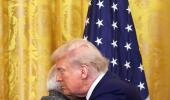
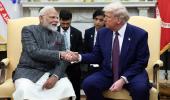

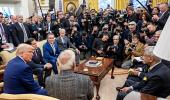
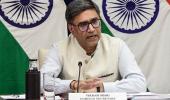




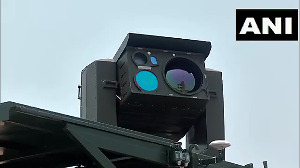

 © 2025
© 2025